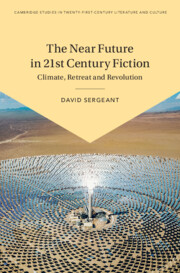Book contents
- The Near Future in Twenty-First-Century Fiction
- Cambridge Studies in Twenty-First-Century Literature and Culture
- The Near Future in Twenty-First-Century Fiction
- Copyright page
- Contents
- Acknowledgements
- Introduction
- Chapter 1 The Domestic Near Future 1
- Chapter 2 The Domestic Near Future 2
- Chapter 3 State of the Arts
- Chapter 4 Diagnostic Dead-Ends
- Chapter 5 The Art of History
- Chapter 6 Identity and Power
- Chapter 7 In Search of Revolution
- Chapter 8 The Genre of Revolution
- Notes
- Bibliography
- Index
Chapter 4 - Diagnostic Dead-Ends
Seeking the Emergent Form
Published online by Cambridge University Press: 07 August 2023
- The Near Future in Twenty-First-Century Fiction
- Cambridge Studies in Twenty-First-Century Literature and Culture
- The Near Future in Twenty-First-Century Fiction
- Copyright page
- Contents
- Acknowledgements
- Introduction
- Chapter 1 The Domestic Near Future 1
- Chapter 2 The Domestic Near Future 2
- Chapter 3 State of the Arts
- Chapter 4 Diagnostic Dead-Ends
- Chapter 5 The Art of History
- Chapter 6 Identity and Power
- Chapter 7 In Search of Revolution
- Chapter 8 The Genre of Revolution
- Notes
- Bibliography
- Index
Summary
If the domestic near future operates with residual and dominant cultural forms, in Raymond Williams’s terms, it also provides glimpses of potential emergent formations. This chapter reads two novels that give a particularly vivid sense of the incipient genre of near-future revolution struggling within inherited genres that can register but not properly embody it. While the eponymous company in The Circle by Dave Eggers (2013) provides a more legible delineation of the Anthropocene than the environmental disasters that often populate the domestic near future, its victory relies on a similar investment in individual embodiment, that has as its correlate a latent antipathy to collective agency – such as might coalesce in the prospective revolution glimpsed at the novel’s close. Odds Against Tomorrow by Nathaniel Rich (2013) progresses from a devastating satire of apocalyptic capitalism into an oscillation between shattered human communities and a dangerous journeying: between capitalist realism in the shadow of dystopia and the adventure romance. However, almost despite itself, the novel dowses at its end towards another kind of collective that would also be another form of novel.
Keywords
- Type
- Chapter
- Information
- The Near Future in Twenty-First-Century FictionClimate, Retreat and Revolution, pp. 82 - 97Publisher: Cambridge University PressPrint publication year: 2022

